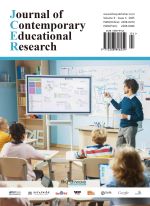Abstract
Practical activities are an indispensable piece of science education. As such, assessment of these practical activities is vital for continually enhancing the quality of science instruction. This article presents a tentative framework structured for assessing practical activities in science education. The proposed framework is built upon seven components: engagement and participation, relational thinking, stepwise mastery, contextualization, multidimensional integration, empowerment, and scientific articulacy. The framework might provide science educators with an alternative lens through which to enhance the effectiveness of practical activities, promote student engagement, and better prepare learners for the future. This framework is designed to be additive and complementary to existing assessment approaches and can be adapted and customized to suit specific local contexts and varying grade levels by science educators in the pursuit of excellence in an ever-evolving science education landscape.
References
Driver R, Bell B, 1986, Students Thinking and the Learning of Science: A Constructivist View. School Science Review, 67(240): 443–456.
Roth K, 1990, Developing Meaningful Conceptual Understanding in Science, in Jones BF, Idol L, (eds), Dimensions of Thinking and Cognitive Instruction, Lawrence Erlbaum, Hillsdale, NJ, 139–176.
Piaget J, 1977, The Development of Thought: Equilibration of Cognitive Structures [Rosin A, Trans.], The Viking Press, New York.
Dewey J, 1997, Experience and Education, Simon & Schuster, New York.
Dewey J, 1961, The School and Society, University of Chicago Press, Chicago.
Bauerle T, Park T, 2012, Experiential Learning Enhances Student Knowledge Retention in the Plant Sciences. Hort Technology, 22(5): 715–718.
Hofstein A, Lunetta V, 2004, The Laboratory in Science Education: Foundations for the Twenty‐First Century. Science Education, 88(1): 28–54.
National Research Council, 2012, A Framework for K-12 Science Education: Practices, Crosscutting Concepts, and Core Ideas, The National Academies Press, Washington, DC.
Shana Z, Abulibdeh E, 2020, Science Practical Work and its Impact on Students’ Science Achievement. Journal of Technology and Science Education, 10(2): 199–215.
Blyznyuk T, Kachak T, 2024, Benefits of Interactive Learning for Students’ Critical Thinking Skills Improvement. Journal of Vasyl Stefanyk Precarpathian National University, 11(1): 94–102.
Abhishek K, 2025, What is Experiential Learning? Everything You Need to Know, viewed March 26, 2025, https://www.wecreateproblems.com/blog/experiential-learning
Abrahams I, Reiss M, Sharpe R, 2013, The Assessment of Practical Work in School Science. Studies in Science Education, 49(2): 209–251.
WestEd, 2024, The 2028 NAEP Science Framework. Contract 91995922C0001, viewed March 25, 2025, https://www.nagb.gov/content/dam/nagb/en/documents/publications/frameworks/science/2028-naep-science-framework.pdf
Ruiz-Primo M, 2009, Towards a Framework for Assessing 21st Century Science Skills, Commissioned Paper for The National Academies, US.
Sadler T, Zeidler D, 2009, Scientific Literacy, PISA, and Socioscientific Discourse: Assessment for Progressive Aims of Science Education. Journal of Research in Science Teaching, 46(8): 909–921.
Edwards F, 2013, Quality Assessment by Science Teachers: Five Focus Areas. Science Education International, 24(2): 212–226.
Millar R, 2010, Analyzing Practical Science Activities to Assess and Improve Their Effectiveness, Association for Science Education, Hatfield.
Duschl R, Osborne J, 2002, Supporting and Promoting Argumentation Discourse in Science Education. Studies in Science Education, 38(1): 39–72.
